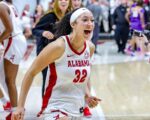Steph vs. Thompson matchup hints at determining Warriors-Rockets factor originally appeared on NBC Sports Bay Area
SAN FRANCISCO – The real challenge facing the Warriors and Rockets as they wade into their first-round playoff series with Game 1 on Sunday is less about the intriguing matchup between Stephen Curry and Amen Thompson than the fascinating subplot within it.
Curry is the superstar whose collection of rings, trophies and plaques is worth millions. He’s 37 years young, according to his splendid performance this season.
Thompson is the gifted tyro who two weeks ago held – sometimes physically – Curry to three points on 1-of-10 shooting from the field, including 1-of-8 from Curry’s playground beyond the arc. Thompson is 22 years young, according to the NBA calendar.
They represent two different basketball generations, and history tells us Curry’s generation faces long odds in this Western Conference playoff series, and those odds only get longer if they get deeper into the playoffs.
Basketball is a young man’s game is more than a superficial phrase often uttered by NBA coaches and retirees. The reminders are frequent and typically come in the postseason.
When an NBA player hits his mid-30s, at the latest, the sun starts dropping on his career and his nights get longer. A few, like fitness fanatics LeBron James and Curry, are meticulous in finding ways to slow its descent, but that big, blinding orb stops for no one.
Draymond Green is 35, as is Jimmy Butler III. The average age of the Curry-Green-Butler trio is a few ticks under 36. Those three carry the bulk of the team’s weight. They are not supported by an established younger star, or they would be seeded higher than seventh.
The Warriors are leaning into their postseason experience and superior basketball intellect to overcome Houston’s superior length and athleticism as well as its youthful energy. The hope is that youth and energy beget recklessness and loss of composure.
Golden State also hopes the five days between its play-in tournament win over Memphis on Tuesday and tipoff at Toyota Center is long enough for its veterans to recover and prepare for what’s ahead.
“I think Draymond in particular, will be rested and ready, and he needed that,” coach Steve Kerr said. “The frustration that I saw with him the last few games as we’re fighting like crazy, and he’s playing the five, battling (Clippers center Ivica Zubac), battling (Rockets center Alperen Sengun), battling (Denver’s Nikola Jokić). The emotion and the energy Draymond has to put forth is incredibly draining. And when he’s tired, when he’s fatigued, that’s when he’s most vulnerable, and he knows that. He and I talked about it.
“The rest of the preparation that’s going into this, I think, will help all of us be composed and poised, because that’s what it takes in the playoffs.”
Every edge, no matter how tiny, is being sought because Kerr realizes the goal of the team’s core is to access its reservoir of experience and make it enough to win. It’s not always enough to pull a team through a playoff series against an energetic squad with a physical advantage.
There are reasons why no 37-year-old has ever been the primary force behind a team prevailing in three rounds of playoff basketball and a victorious NBA Final. The only 35-year-olds to manage the feat were Wilt Chamberlain of the Lakers in 1972, Michael Jordan of the Bulls in 1998 and LeBron with the Lakers in the shortened bubble season in 2020.
James had prime Anthony Davis, 27 years old and already a seven-time All-Star. In Jordan’s last title, he was accompanied by Scottie Pippen, a 32-year-old seven-time All-Star, and 37-year-old Dennis Rodman.
When Kareem Abdul-Jabbar won the 1985 Finals MVP at age 38, his impact was greatly inflated by the production of five-time All-Star point guard Magic Johnson (25) and perhaps the game’s best two-way wing James Worthy (24).
Tim Duncan won his last ring with the San Antonio Spurs at age in 2014 at age 38, Manu Ginobili was 36 and Tony Parker was 32. The Finals MVP award went to a 22-year-old named Kawhi Leonard.
The Warriors encountered the experience-gap dynamic in the 2022 NBA Finals against Boston, which had a younger, more athletic roster. The Celtics won two of the first three but struggled as the water got deeper – to a place where the Warriors were comfortable. When Curry silenced TD Garden in Game 4, it was the first of three consecutive double-digit losses for Boston.
The last time the Warriors confronted a younger opponent in the postseason, they lost Games 1 and 2. They found enough energy to come back and win four of the next five to take a first-round victory over Sacramento. Water got too deep for the Kings.
The Warriors, however, were pushed to the brink, outscoring Sacramento by a mere 15 points over seven games. That left Golden State with a hangover that surfaced in the conference semifinals against the Lakers. The Warriors dropped three of the first four games to Los Angeles – and lost all three at Chase Center, by an average of 18 points before losing the series in six.
Golden State’s task now goes far beyond whether Curry, aided by schematic actions, makes the adjustments required to offset Thompson’s spirited defense. Steph’s history is to diagnose and respond. Can he do it yet again?
Do the Warriors have enough to force the Rockets to play halfcourt basketball, drag them to the deep end and dunk them?
This expedition is to climb a mountain yet to be scaled by any group led by such an NBA-old core. No doubt the Warriors know how to beat Houston. They will if they still have the vitality to ensure their knowledge is effectively applied.
